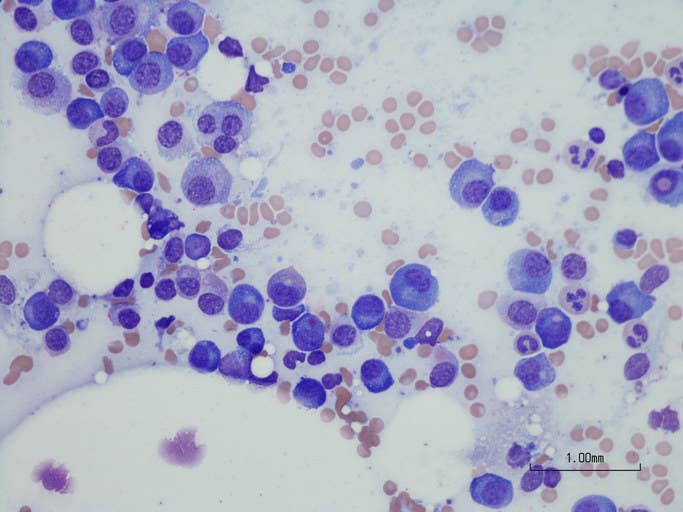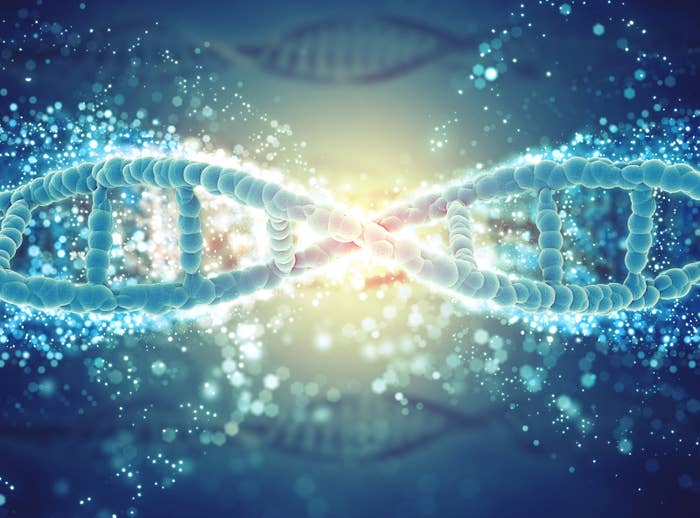
According to a new study in the journal Science, about 2 out of every 3 cancers are caused by random, unpreventable mutations as the body's cells divide normally. The researchers are hailing it as a "paradigm-breaking" finding, and it's been widely covered, but other scientists in the field say it is not new, and that it is a reworking of a previous study by the same authors that was widely criticised.
The research looked at 32 types of cancer in patients in 69 countries, and found that nearly two-thirds of the mutations that caused them were not the product of lifestyle factors – such as smoking or obesity – or genetics, but were simple mistakes made as the cells copied their DNA to make new cells. These mutations are responsible for about 6 out of every 10 cancers.
The authors described this as "bad luck". Bert Vogelstein, a professor of oncology at Johns Hopkins University in Baltimore, told a briefing: "Every time a perfectly normal cell divides it makes several mistakes, mutations. Most of the time these mutations don’t do any harm – they occur in junk DNA, unimportant to cancer. And that’s the usual situation and that’s good luck.
"Occasionally, though, they occur in a cancer driver gene, and that’s bad luck." The study also found that cancers in body parts with lots of natural cell division – such as the lining of the bowel, where the cells replenish themselves every few days – have more of these random mutations, and so more "bad luck" cancers, than tissues that replace themselves more slowly.
Vogelstein's co-author Christian Tomasetti said the "current paradigm" recognises "two factors – the environmental or lifestyle factor, and the hereditary factor. We feel our new research breaks this paradigm." He said the study is important because it will push researchers to work harder on "secondary prevention", catching and stopping cancers when they are still small and localised. "It's a war on cancer," he said. According to Cancer Research UK, 350,000 people were diagnosed with cancer in 2014 in Britain, and 160,000 died. "If that's not a war, I don't know what is," said Vogelstein.
What this study shows, he says, is that rather than the "enemies" in the war being external – meaning that the best strategy is to keep them out – most are internal. "One of the best strategies is to nip the attacks of the internal enemies in the bud, before they’ve widely spread, when they can still be cured by simple surgery and adjuvant therapy," he said.

The findings will also be useful in reassuring the parents of children with cancer that they are not to blame, he said. "We hope [this study] offers comfort to the literally millions of patients who didn’t smoke and who avoided the sun and ate healthily, done everything possible to avoid cancer but still got it," he said. "It's particularly important for parents of children with cancer, who may look on the web and see that cancer is caused by environment and heredity.
"That says to parents, either I transmitted a bad gene to you or I exposed you to some environmental agent which caused your cancer. That causes an amazing amount of guilt. I hope this will help parents understand that these cancers would have occurred no matter what they did – we don't have to add guilt to an already tragic situation."
But scientists BuzzFeed News spoke to were sceptical that this study moved the state of science on a great deal. "To be honest, I'm not sure it really adds to the field," Dr Emma Smith, science information manager at Cancer Research UK (CRUK), told BuzzFeed News.
"We’ve known for an extremely long time that as cells replicated, the copying isn’t 100% perfect, and mistakes can just happen. They [the study's authors] agree with the figure CRUK gives, which is that about 4 in 10 cancers are preventable, so they haven't found anything particularly new.
"And the take-home message seems to be that some cancers just happen. Well, cancer is part of being human, but 4 in 10 could be prevented because of the way we live our lives, and I think that's a much more important message."
The study is a revisit of a 2015 Science paper by the same authors that found similar results but only looked at the US. Dr Rob Noble, now of ETH Zurich but then at the Institut des Sciences de l’Evolution de Montpellier, wrote a critique of that study. He told BuzzFeed News most of the criticisms of that paper still stand. "What they're saying is that there's an important contribution to cancer causation which is random," he said. "But people have been saying that for 40 years.
"The original paper was interesting, and I'm glad it was published, but I don't think it can tell you what proportion of cancer cases are due to environment and which are due to bad luck. They can tell you there's a correlation between how many cell divisions there are in a tissue and cancer, but they can't tell you more than that.
"This paper draws more attention to the fact that not everything is down to preventable factors, but it doesn't produce any new risk estimates, and in that sense I don't think it adds much to the epidemiology."
Dr Claire Shannon-Lowe of the University of Birmingham's Institute of Immunology and Immunotherapy told BuzzFeed News: "This just seems to be a confirmation of the 2015 study, albeit in a bigger cohort of patients. There was a lot of commentary about this study back in 2015 where there was significant criticism about the way the study was analysed, from many parties.
"It seems that they are saying the same thing as they did in 2015. They did this new study to answer one of the original criticisms, but they have by no means addressed all the criticisms levelled at the first study. I bet it'll be open to loads of comments again."
